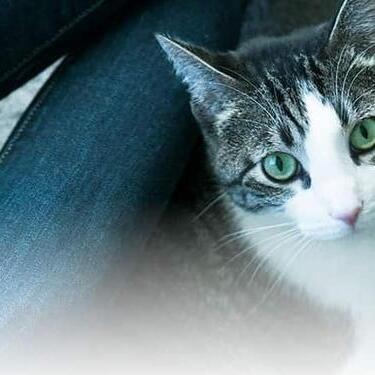
-
Find the right food for your pet
Take this quiz to see which food may be the best for your furry friend.
Find the right food for your pet
Take this quiz to see which food may be the best for your furry friend.
Featured products
 Adult Healthy Cuisine Roasted Chicken, Carrots & Spinach Stew Dog Food
Adult Healthy Cuisine Roasted Chicken, Carrots & Spinach Stew Dog FoodDelicious roasted chicken paired with tender vegetables in a succulent stew
Shop Now Small & Mini Savory Stew with Chicken & Vegetables Dog Food
Small & Mini Savory Stew with Chicken & Vegetables Dog FoodA delicious complement to the nutrition of Science Diet Small & Mini 7+ dog food
Shop Now Adult 7+ Perfect Digestion Chicken, Whole Oats & Brown Rice Recipe Dog Food
Adult 7+ Perfect Digestion Chicken, Whole Oats & Brown Rice Recipe Dog FoodScience Diet's breakthrough nutrition supports ultimate digestive well-being & healthy microbiome for dogs age 7+
Shop NowFeatured products
 Adult Savory Entrée Can Variety Pack Cat Food
Adult Savory Entrée Can Variety Pack Cat FoodPrecisely balanced nutrition with the delicious taste of savory minced chicken to help fuel the energy needs of cats during the prime of their life
Shop Now Adult 7+ Senior Vitality Chicken & Vegetable Stew Cat Food
Adult 7+ Senior Vitality Chicken & Vegetable Stew Cat FoodImproves Everyday Ability to Get Up & Go
Shop Now Adult 7+ Tender Tuna Dinner Cat Food
Adult 7+ Tender Tuna Dinner Cat FoodWith delicious chunks in a decadent gravy
Shop Now -
Dog
- Dog Tips & Articles
-
Health Category
- Weight
- Food & Environmental Sensitivities
- Urinary
- Digestive
- Joint
- Kidney
-
Life Stage
- Puppy Nutrition
- Adult Nutrition
- Senior Nutrition
Cat
- Cat Tips & Articles
-
Health Category
- Weight
- Skin & Food Sensitivities
- Urinary
- Digestive
- Kidney
-
Life Stage
- Kitten Nutrition
- Adult Nutrition
Featured articles
 Do Dogs and Cats have Belly Buttons?
Do Dogs and Cats have Belly Buttons?Learn whether cats & dogs have belly buttons like humans, what the function is, and if there are any health concerns associated with it.
Read More Does My Pet Hate Me?
Does My Pet Hate Me?Learn tips for bonding with your pet if you've ever thought, 'My dog doesn't like me, or 'Why do I have a standoffish cat?'
Read More Why Are Dogs and Cats So Cute?
Why Are Dogs and Cats So Cute?If waggy puppy dog tails and furry kitten yawns make you swoon, you're not alone. Why are cats so cute? And, dogs too! Let's find out!
Read More -


Can cats have Down syndrome? Veterinarians hear this question more often than you might think. People typically ask it when their cat seems to look and behave abnormally, in a manner that resembles Down syndrome.
Cats with unusual facial features and certain behavioral abnormalities have become popular in social media circles. Claiming they have a "Down syndrome cat," some pet parents created social media accounts for them, thereby advancing the belief that Down syndrome can occur in cats.
Can Cats Have Down Syndrome?
Internet buzz notwithstanding, cats don't develop Down syndrome. In fact, they can't.
First, a bit about Down syndrome: It's a disorder that affects one in 700 human babies born in the U.S. each year. It occurs when the developing fetus's genetic material is copied incorrectly, resulting in an extra chromosome 21 (or a partial chromosome 21). This condition is also called trisomy 21.
Essentially, chromosomes organize the DNA in each cell into bundles, helping cells to pass on this genetic material when they divide. An extra chromosome 21 (or partial chromosome 21) causes a variety of birth defects that give people with Down syndrome their shared physical traits.
According to the National Down Syndrome Society, people with Down syndrome tend to share some or all of the following traits:
- Low muscle tone
- Small stature
- An upward slant to the eyes
- A single, deep crease across the center of the palm
It's important to note that people with Down syndrome do not all look the same.
Why Down Syndrome Cats Don't Exist
Humans have 23 chromosomes. Cats have 19. As such, having an extra chromosome 21 is clearly impossible for cats. But that doesn't mean cats can't occasionally have extra chromosomes.
In fact, a 1975 paper published in the American Journal of Veterinary Research identified a rare chromosomal abnormality in male cats that allows for one extra chromosome, resulting in a condition similar to Klinefelter syndrome in humans. These cats are especially noteworthy because the extra chromosome carries genetic material that affects their coloration. This condition causes these male cats to be tricolored ("calico" or "tortoise-shell"), a color pattern normally only seen in female cats.
Abnormalities That May Resemble Those of Down Syndrome
There have been some particularly noteworthy cats on Instagram that became internet sensations after their parents claimed that their cats owe their unusual appearances to extra chromosomes. It's unclear, however, whether these claims of chromosomal disease have ever been verified through genetic testing.
Despite the questionable claims and biological realities, "feline Down syndrome" has become a popular term. It is important to note, however, that the veterinary community does not recognize feline Down syndrome as a veterinary condition and, furthermore, does not advocate the transference of human conditions to animals on the basis of physical appearance or behavior. To do so may be construed as disrespectful to people who live with these conditions.
Nonetheless, there are some physical and behavioral traits that may lead well-meaning people to mistakenly assign human conditions to cats. A so-called "Down syndrome cat" typically manifests some distinctive characteristics, including:
- Broad noses
- Upturned eyes (which may be set widely apart)
- Small or unusual ears
- Low muscle tone
- Difficulty walking
- Difficulty with elimination (urination or defecation)
- Hearing or vision loss
- Heart problems


Tasty Tips
Cats With Physical and Behavioral Abnormalities
The physical features and behavioral abnormalities of so-called "Down syndrome cats" are indicative of some other condition, one which may not even be genetic in origin.
The appearance and behavior of these cats may stem from a wide variety of problems, including infections, neurological diseases, congenital abnormalities and even trauma. Cats infected in utero with the panleukopenia virus can develop several of the relevant physical and behavioral abnormalities. Further, some cats have cerebellar hypoplasia, a condition that can cause some of the behaviors and traits of these "Down syndrome cats."
Cats whose mothers were exposed to certain toxins can suffer various congenital malformations affecting facial structure and the neurological system. What's more, trauma to the head and face, especially at a very young age, can cause permanent neurological damage and facial injuries that may appear to have been present since birth.
Expectations for Special Needs Cats
If your cat exhibits some behavioral and physical abnormalities, then she may be what is typically called a "special needs cat." Special needs cats often display many traits that might resemble, to the casual observer, those associated with Down syndrome, even though cats cannot actually develop the condition.
Special needs cats require special care. Their pet parents must take extra care to protect them from the hazards of, for example, pools and stairs, as well as from predators and other dangers to which they're vulnerable. They may need help performing basic functions (cleaning themselves, eating and drinking, etc.) or navigating life with vision or hearing loss.
Whatever you do, be sure to enlist your veterinarian as an ally. Anyone whose cat requires special care should learn about the full range of healthcare options.


Dr. Patty Khuly is an award-winning veterinarian known for her independent thinking, her spirited pet advocacy, her passion for the veterinary profession, and her famously irreverent pet health writing.
Dr. K is an honors graduate of both Wellesley College and the University of Pennsylvania School of Veterinary Medicine. She received her MBA at The Wharton School of Business as part of the prestigious VMD/MBA dual-degree program. She now owns Sunset Animal Clinic, a veterinary practice in Miami, Florida.
Related products

Supports energy level and beautiful fur in mature cats

Improves Everyday Ability to Get Up & Go

With delicious chunks in a decadent gravy

Precisely balanced nutrition with the delicious taste of savory minced chicken to help fuel the energy needs of cats during the prime of their life
Related articles

Discover which cat toys games your feline friend might like, and how they are great sources of exercise. Explore our library of articles to learn more.

Discover the benefits of Hill's line of kitten foods and how they provide complete and balance nutrition for growing kittens.

Discover how to identify cat sensitive skin and what you can do to help your cat thrive from head to paw.

Brushing your cat's teeth is just as important as brushing your own. Learn signs or oral health problems in your cat and how to avoid them.

Put your cat on a diet without them knowing
Our low calorie formula helps you control your cat's weight. It's packed with high-quality protein for building lean muscles, and made with purposeful ingredients for a flavorful, nutritious meal. Clinically proven antioxidants, Vitamin C+E, help promote a healthy immune system.
Put your cat on a diet without them knowing
Our low calorie formula helps you control your cat's weight. It's packed with high-quality protein for building lean muscles, and made with purposeful ingredients for a flavorful, nutritious meal. Clinically proven antioxidants, Vitamin C+E, help promote a healthy immune system.

